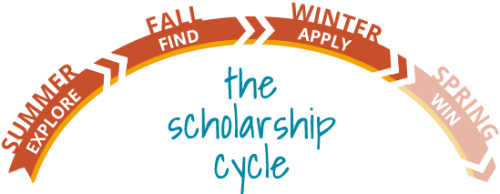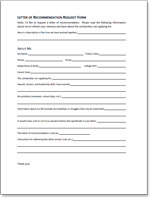Start your application

Winter break is a great time to work on your application! You’ll be ready when the deadline comes.
A scholarship application can seem daunting, but if you work on it piece by piece, it’s definitely doable. Think of it as a homework assignment: do a little bit every day and before you know it, it’s done!
Reminder: before starting your scholarship application, be sure you have applied to the colleges you are hoping to attend.
Pieces of the application
There is the application itself, which will have easy questions, like your name and email. Then there will be additional pieces, which usually consist of:
- Essays: describe yourself and your goals (check out the next page)
- FAFSA: information about your income
- Transcripts: your school records
- Recommendations: other people describe how great you are
FAFSA
What it is
Some scholarships consider financial need when deciding who will receive a scholarship. To do this, they have you fill out the FAFSA. This form is the application for financial aid, but it is also a standardized way of determining financial need.
About loans: the FAFSA is the application for student loans, but you are not required to take any loans. If you don’t want loans, simply decline them.
How to do it
Go to the FAFSA site and follow the instructions.
When to do it
The FAFSA opens every year on October 1. Do it as close to that day as possible.
Can you do anything about it?
If you’re worried you won’t be eligible for scholarships because of income level, don’t let that deter you from applying. Scholarships evaluate financial need in different ways. So just make sure to do your FAFSA early and then don’t worry about it.
Not eligible for the FAFSA?
Only US citizens or eligible non-citizens can complete the FAFSA. (In Oregon, if you’re not eligible for the FAFSA, you may be eligible to complete the ORSAA.) So, some scholarships have alternatives for international and undocumented students. The PCC Foundation has a form for international students who aren’t eligible for the FAFSA or ORSAA. There are also scholarships specifically for students who are not FAFSA eligible. International students, ask International Education for help finding these scholarships. Undocumented students, ask at the Multicultural Center
Transcripts
Do turn in:
- Only the transcripts requested
- The correct type of transcript
Don’t turn in:
- Report cards
- Degree audits
- Registration reports
- Academic evaluations
What it is
Scholarships ask for transcripts to see your school work and grades.
How to do it
Look for two things: how much history they want, and if they want official or unofficial copies.
Current or previous school: read the description carefully – they will tell you exactly which transcripts they want. Usually, they want only your most recent transcript, not all of your academic history.
Official or unofficial copies: the application will specify one type – send the right one.
- Official: Order from your school’s student record office or website. Official transcripts will be sealed (don’t open them). If possible, have them sent directly to the scholarship agency.
- Unofficial: Order from the school or print from the school website. Make sure unofficial transcripts have your name, the school name, each course taken, grades, and credit hours.
When to do it
For official transcripts, request transcripts at least 2 weeks before the scholarship application deadline. For unofficial transcripts, you can usually print them from your school’s website and include them with your application.
Recommendations
What it is
Scholarship agencies will often ask you to provide letters of recommendation – basically a statement from someone you know describing why you deserve a scholarship. Recommendations are important to your scholarship application because it confirms your skills and shows you stay connected with the community around you.
How to do it
- Think of someone who knows you well, either professionally or academically – someone who knows your abilities and can provide positive comments.
- Contact this person and ask if they would be willing to be a reference for you. Tell them it will involve writing a one to two paragraph letter stating how they know you and providing examples of your good work.
- Reach out to your potential reference well in advance (at least one month before the deadline).
- If they agree to provide a recommendation, let them know any guidelines they need to meet and the deadline for submission.
- Give your reference a little help by using the recommendation request form. This gives you a chance to clearly state what you would like your reference to touch on, and when you would like the letter to be done.
- If you haven’t heard back, follow up with your reference. If they don’t have time or don’t want to do it, don’t worry. Just ask someone else. If you need a letter quickly, call the person (do not email), and let them know exactly what you need and when.
- It is important to thank the people who write you letters – especially last-minute letters. Either send them a thank you card or email them.
Who to ask:
- Yes: Teachers
- Yes: Mentors
- Yes: Coaches
- Yes: Supervisors
- Yes: Advisors
- Yes: Tutors
- Yes: Co-workers
Now that you’ve got some of the paperwork figured out, it’s time to start working on your essays.

 Recommendation request form
Recommendation request form